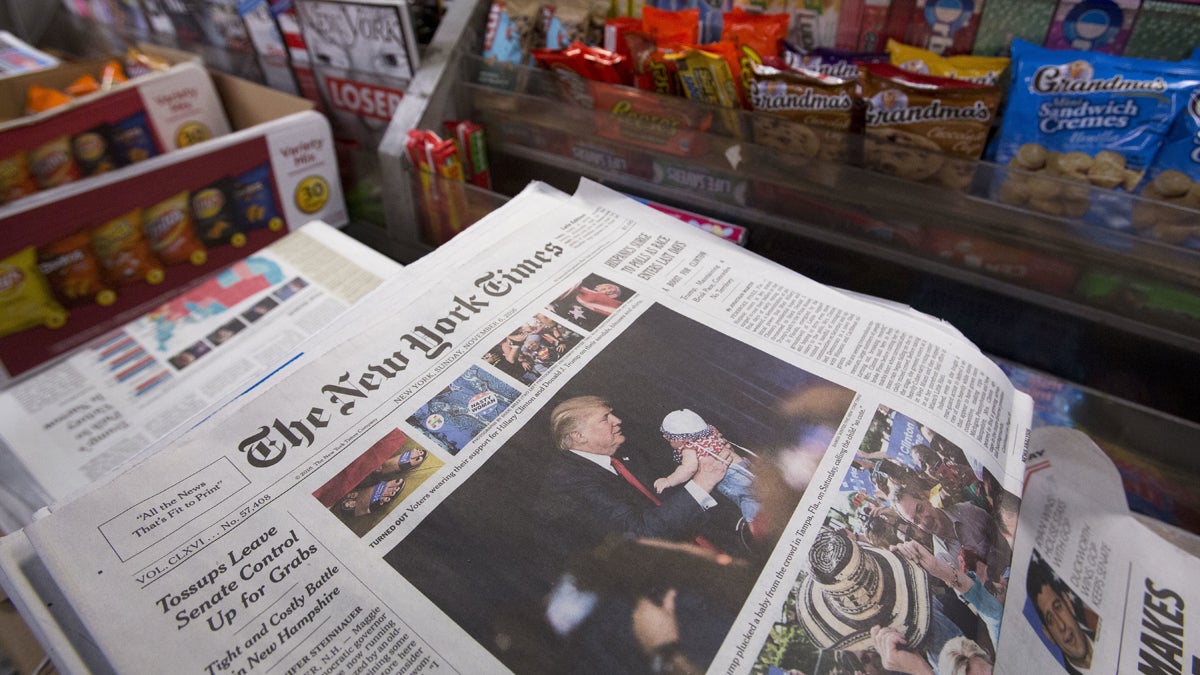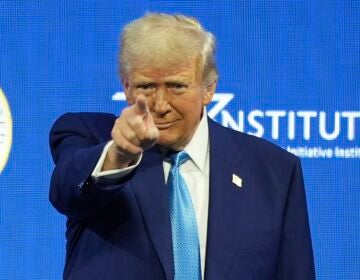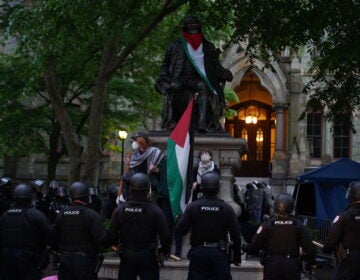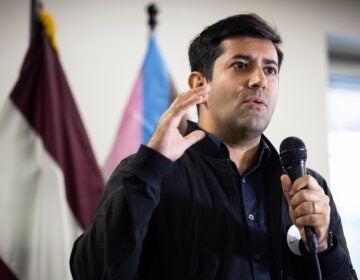For minority communities, Trump’s election reopens old wounds caused by bigotry

Page one of The New York Times features President-elect Donald Trump's victory
On a mild Tuesday night eight years and one week ago, I took a road trip from Detroit to Chicago. I was a 29-year-old graduate student who had just voted that morning in Michigan. I wanted to witness history, so I figured why not go for it.
I drove three and a half hours, got a hotel room, and headed to Grant Park. The vibe around the city was unbelieveable, and there was a sense that something big was going to happen.
A historical contrast
By 10 p.m. Central Standard Time, when California was called for then-Senator Barack Obama, the crowd, which was estimated at nearly a quarter-million people, erupted in a scene that has since only been rivaled in that city by its celebration of the Cubs’ World Series victory two weeks ago.
There were loud cheers, jubilant chants. White police officers hugged black citizens and exchanged high-fives. People of all colors were waving American flags while chanting “USA! USA!” It was a startling scene. The type that I couldn’t picture in a movie or video game.
As the newly elected president took the stage with his wife and daughters, I reached for my hip and grabbed my cell phone to fire off a call to Detroit.
My mom answered the phone, completely gobsmacked at what she was witnessing on TV. I could hear my dad clapping and laughing in the background. When she was finally able to find the words, my mother spoke of my late grandparents and their struggle to vote in the Jim Crow South. How people faced threats of physical harm and death if they even thought about voting.
As the enormity of everything hit her, she broke down in tears. Mine followed not long after.
Fast forward to last week Tuesday. As many millions of people around the country and around the world were marveling — a number of them, honestly, horrified — at what was transpiring, I was once again on the phone with my mother.
She’s in her early 70s now, born during World War II in a small rural town in Alabama not far from Birmingham in the heart of Jim Crow country. My father was born in Detroit and was a teenager during the Civil Rights movement.
As I talked to my mother, the shock and disbelief at the history we were watching was palpable. My dad sat silent in the background.
“I can’t believe this,” she said, shaken. “What is going on? I’ve seen this before.”
And then she broke down in tears. Mine followed not long after.
A big change
My mother’s fears are not unfounded. Millions of black and brown people woke up last Wednesday morning fearful.
Muslims and Latinos around this country were wondering what’s next, and with good reason.
According to the Southern Policy Law Center, more than 200 incidents of hate and intimidation have been reported to them since Election Day.
A multitude of stories, pictures, and viral videos from around the country — including multiple times here in Philadelphia — have popped up showing everything from swastikas, to high school students in York carrying Trump signs and chanting “white power!” to middle school students in Royal Oak, Mich. (just 15 minutes from my native Detroit) taunting Latino kids with chants of “build the wall!”
Just this past weekend a University of Oklahoma student was suspended after he targeted black freshmen at Penn. The students were added to a group on the text app GroupMe called “N—- Lynching.” The messages came from people using the internet pseudonym “Daddy Trump,” as well as being punctuated by “Heil Trump.”
Philadelphia Mayor Jim Kenney and Gov. Tom Wolf have issued statements condeming these actions almost daily since the election.
“Everyone is welcome in Philadelphia regardless of whether they are a freshman at one of our universities or if they’ve always called Philadelphia home,” Kenney’s Saturday statement read. “It is heartbreaking to see this type of activity here in the birthplace of our democracy and the city of brotherly love.
“I urge the Philadelphia Commission on Human Relations to investigate and hold all responsible parties accountable for this disgusting behavior.”
Of note, the Philadelphia GOP issued a statement on Monday that addressed the Penn incident before straying off course
During the campaign, reporters who covered the Trump campaign were routinely tormented by people at his rallies and on social media. NPR’s Asma Khalid is Arab-American and Muslim and she wears a hijab.
She is often subjected to terrible and hateful messages on Twitter. So much so that every couple of days she retweets the worst of the worst.
ABC’s Candace Smith was — until the campaign’s final week — the only African-American reporter covering Trump on the trail. She described life on the road.
“On Twitter, I’ve been called a ‘n—–,’ a ‘c—‘ and, at times, a combination of the two,” Smith said. “One person who claimed to be Christian — as I am — tweeted, “You are a Hillary whore and, thus, can not possible be saved by Grace. Grace wouldn’t have a whore like you.”
Smith also talked about another common presence at Trump’s rallies: Confederate flags. The flags, regarded as a symbol of racism by people of color and many others, were prevalent in more than just the South.
“I saw them in Pittsburgh, in North Carolina, in San Diego and in Florida,” she said. “When I noted the flags, people on Twitter would ask why I was so obsessed with race?’
Many of his supporters have said that bigotry didn’t play a role in his appeal — that it was simply “economic anxiety” that drove so many people to him. For people of color, those observations seem naïve, obtuse, or disingenuous.
Especially when white supremacists like David Duke are hailing Trump’s win and the Ku Klux Klan is taking literal victory laps around the South.
Tanzina Vega, the exceptional former New York Times reporter who now works for CNN, helped decode many of the “dog whistle” phrases that Trump used in his speeches and rallies. The phrases often relied on old stereotypes and tropes about communities of color.
Trump’s insistance on pushing the long-debunked idea that President Obama was not born in the United States also did him no favors. It was a line of assault against the president that is seen as both racist and insulting to African-Americans.
Now, for millions of African-Americans, the thought of the nation’s first black president having to hand over the reigns to the man who only late in the campaign put to rest his questions about the president’s citizenship, is like a swift kick in the face.
The tears my mother shed are not the only ones.
Everything to lose
In the days since, I’ve heard people call for “unity” behind Trump and ask to essentially wipe the slate clean on a man who at times built his campaign on vilification of entire groups of people. Just “give him a chance,” they say.
Speaking as a journalist, I’m highly skeptical considering his lack of transparency. Speaking as a black man, it’s tough to get the toothpaste back in the tube considering the campaign’s rhetoric and a history of alleged discriminatory practices in Trump’s real estate and casino business.
Trump’s supporters bristle at the notion that just because they supported him, that means that they are racist or bigoted. They argue that they shouldn’t be painted with a broad brush — despite Trump often doing just that to Latinos, Blacks, and Muslims.
The common response to this from people of color is that since his statements and treatment of minorities — and women — was not seen as a dealbreaker, his supporters should share in the collective shaming.
In the 21st century, racism and prejudice is not something you can respond to with a “Yeah, but …”
At the end of the day, I can’t help but think about the Muslim woman living in South Philly or in Dearborn, Michigan, or the Somali immigrant in Minneapolis who thinks that someone might try to attack her for wearing a hijab or speaking Arabic. I can’t help but think of the Mexican immigrant family in Laredo, Texas, or in Knoxville, Tennessee, or in Chester County fearing they will be forced from their homes.
I think of the Jewish families seeing swastikas scrawled on windows, triggering feelings of a terrifying past that some only read about in books. I think about all of the women who feel that this election will embolden those men who believe sexual assault is not a big deal.
I think of the transgender kid and married gay couple who wonder if they will be demoted into second-class citizenship once again.
The tears I shed on Nov. 4, 2008, were those of adulation, hope, and a promise for a future. The thought that while we’ll never be “post-racial,” we finally turned a corner. The tears I shed on Nov. 8, 2016, were those of a man who realized that the country has reneged on that promise, electing someone who will work to dismantle all the signature achievements of our first black president.
—
Editor’s note: This essay has been updated from a version posted last week to address recent news events.
WHYY is your source for fact-based, in-depth journalism and information. As a nonprofit organization, we rely on financial support from readers like you. Please give today.




